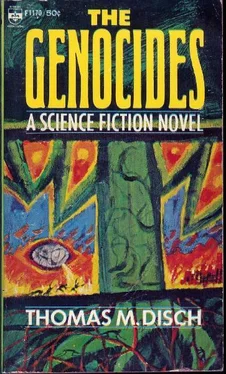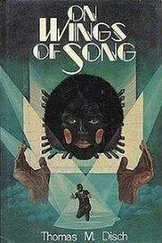“That,” she said, the old music quite gone for her voice, “is all the best that Neil can do. And I must say that between the two of you he does that better.”
Buddy laughed a solid, good-humored laugh and left her, feeling some of the old stallion blood rising in him. Ah, he had forgotten what a magnificent wit she could muster. Absolutely the only one left with a sense of humor, he thought. And still the best-looking. Maybe they would get together again.
Eventually.
Then he remembered that it was not a day to be in a good humor, and the smile left his lips and the stallion quieted and went back to his stall.
There was something of the mouse about Maryann Anderson. Mouse was the color of her hair: a lusterless gray-brown. There was a mousy tendency, when her mind was on other things, for her lips to part, revealing largish, yellowed incisors. Worse, she had, at the age of twenty-three, a faint, downy mustache. She was short, no more than five feet two, and thin: Buddy’s thumb and middle finger could completely encircle her upper arm.
Even her good qualities were mousy: She was perky, industrious and content with scraps. Though she would never be a beauty, she might once have been thought cute. She was submissive. She did not intrude.
Buddy didn’t love her. There were times when her very passivity infuriated him. He had been used, on the whole, to something more. Still, it was as hard to find fault with Maryann as it was to find anything particularly to admire. Buddy was comfortably sure that she would never be unfaithful, and as long as his wants were looked after, he didn’t really resent Maryann for being his wife.
Maryann, for her part, could not reciprocate this indifference. She was slavishly devoted to her husband and hopelessly, girlishly in love with him. Buddy had always been able to elicit a species of self-sacrificing devotion, though he had usually called for a different sort of sacrifice, and his altars, so to speak, were dark with the blood of his victims. But be had never tried to exert this influence on Maryann, who had only interested him for one brief moment and then not amorously but by her pitiableness.
It had been during the fall of the fourth year after the Plants had come, and Buddy had only just returned to Tassel. A party of marauders, Maryann among them, had somehow worked their way up from Minneapolis. Instead of raiding, they’d been foolish enough to come to the village and ask for food. It was unheard of. The invariable rule was for marauders to be executed (hunger could turn the lambs to wolves), but a small controversy arose in this case, because of the seeming good-will of the prisoners. Buddy had been among those in favor of releasing them, but his father—and the majority of the men—insisted on execution.
“Then at least spare the women,” Buddy had pleaded, being still rather sentimental.
“The only woman that goes free is the one you take to wife,” Anderson had proclaimed, extemporizing the law, as was his way. And quite unexpectedly and out of pure cussedness Buddy had gone and chosen one of them, not even the best-looking one, and made her his wife. The other twenty three marauders were executed, and the bodies were properly disposed of.
Maryann didn’t speak unless spoken to, but in their three years together Buddy had picked up enough bits and pieces of her background to convince himself that her depths were no more interesting than her surfaces.
Her father had been a bank clerk, scarcely more than a teller, and she had worked for one month in a stenographic pool before the world had entirely collapsed. Though she had gone to a parochial grade school and later to St. Bridget’s, where she took the commercial course, her Catholicism had never been more than lukewarm at best, with hot flashes around the holidays. In Tassel she was able to adopt Anderson’s homemade and apocalyptic brand of Congregationalism without a qualm.
But Maryann’s special distinction was not her conversion from papistry: it was the new skill she had brought to Tassel. Once, almost by chance, she had taken a night course in basket-weaving at the CYO. Something in Maryann, something quite fundamental, had responded to the simplicities of that ancient craft. She experimented with the thicker rushes and with swamp grasses, and when the shortages began, Maryann went out on her own and began stripping the smooth green boles of the Plants and shredding their great leaves into raffia. Right to the end, to that day when the Government trucks failed to show up in the city for the morning dole, she went on making her baskets and bonnets and sandals and welcome mats. People thought it silly, and Maryann herself considered it a weakness. That it was the one thing that the poor mouse had ever done well or found more than passing satisfaction in escaped their attention and hers.
In Tassel, Maryann’s light was no longer hidden, as it were, beneath a bushel. Her basketry quite transformed the village’s way of life. After the fatal summer when the Plants invaded the fields, the villagers (the five hundred who were left) had picked up as many pieces as they could carry and took themselves to the shore of Lake Superior, a few miles away down Gooseberry River. The lake had been receding at a prodigious rate, and in several areas the water was two or three miles from the old, rock-strewn shore line. Wherever the water retreated, the thirsty seedlings sprang up, sank roots, and the process accelerated.
That fall and through the winter, the survivors (their number, like the lake, was always shrinking) worked at clearing as large an area as they could hope realistically to maintain for their own fields the next year. Then they began to sink their own roots. There was little timber but what they could scavenge from the old town. The wood of the Plant was less substantial than balsam, and most of the trees native to the area had already rotted. The villagers had the clay but not the skill to make brick, and quarrying was out of the question. So they spent the winter in a great grass hut, whose walls and roof were woven under Maryann’s supervision. It had been a cold, miserable November, but a person could keep his fingers warm weaving. There was a week in December when the panels of the commonroom were blown halfway back to the old village. But by January they had learned to make a weave that was proof against the worst blizzard, and by February the commonroom was downright cozy. It even had a welcome mat at each of the doors.
No one had ever regretted admitting the clever mouse to the village. Except, occasionally, the mouse’s husband.
“Why isn’t there any dinner?” he asked.
“I was all day with Lady. She’s awful upset about Jimmie Lee. Jimmie was her favorite, you know. Your father didn’t help much either. He talked all the time about the Resurrection of the Body. He must know by now she doesn’t believe the same as he does.”
“A person has to eat just the same.”
“I’m fixing it, Buddy. As fast as I can. Buddy, there’s something—”
“Father’s feeling better then?”
“—I wanted to tell you. I never know how your father is feeling. He’s acting the same as ever. He never loses control. Neil’s going to be whipped tonight—I suppose you heard about that?”
“Serves him right. If he’d fixed the gate shut, that whole thing wouldn’t have happened.”
“What whole thing, Buddy? How can a person be burnt to ashes like that in the middle of the forest? How can that be?”
“You’ve got me. It doesn’t seem possible. And those cows and Studs, besides. Seven tons of beef turned to ash in less than ten minutes.”
“Was it lightning?”
“Not unless it was the lightning of the Good Lord. I suspect it’s marauders. They’ve invented some new kind of weapon.”
Читать дальше












